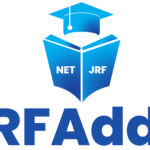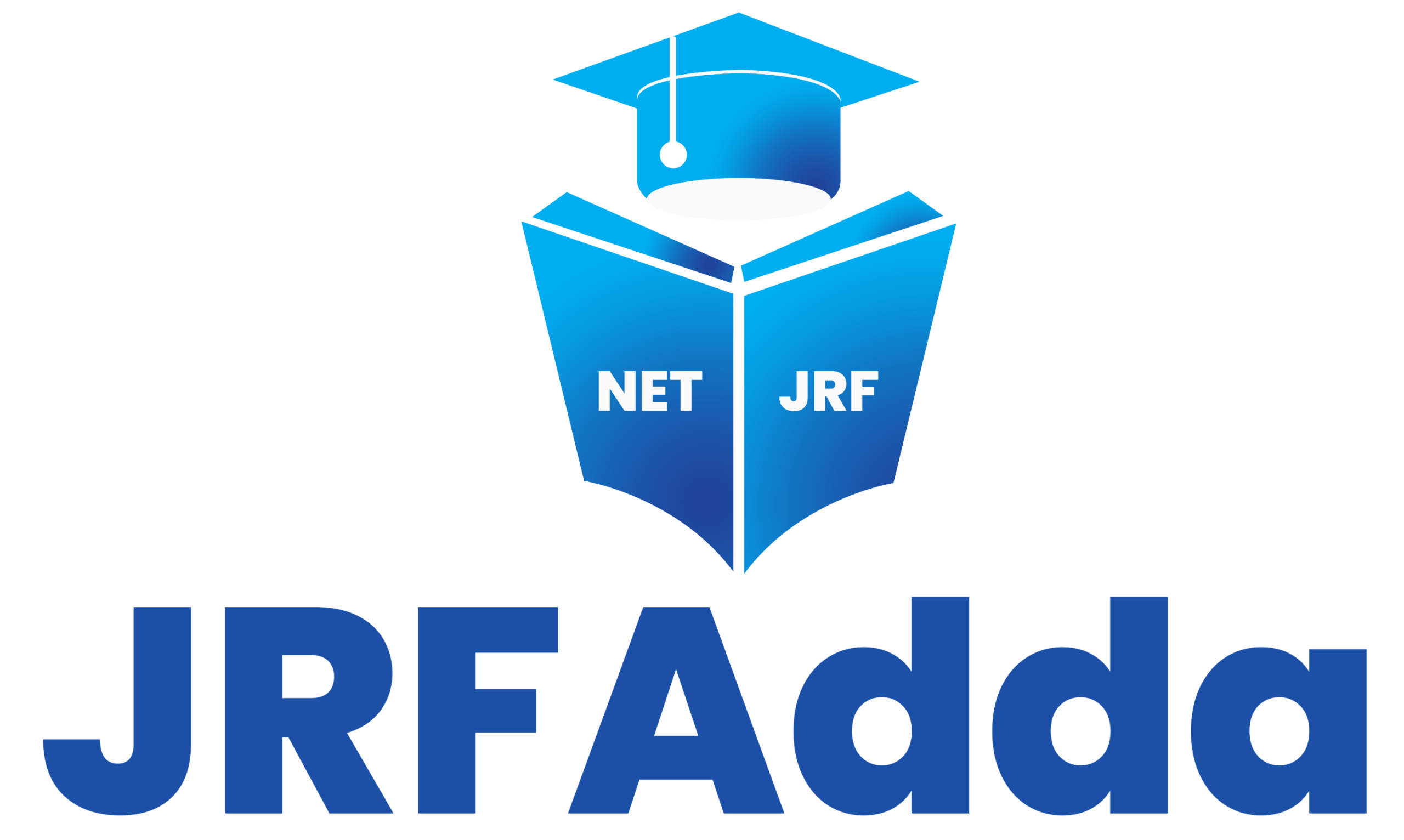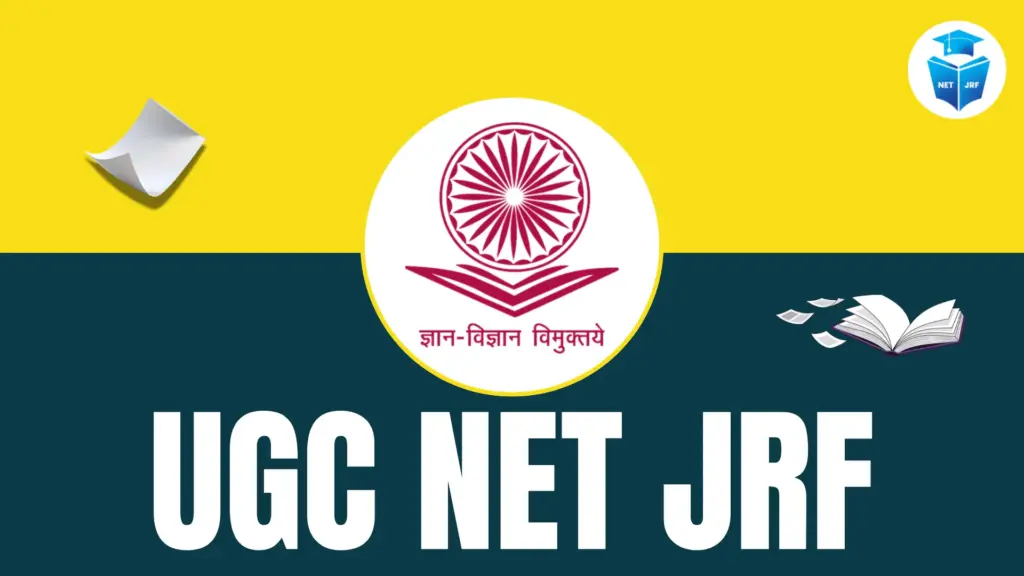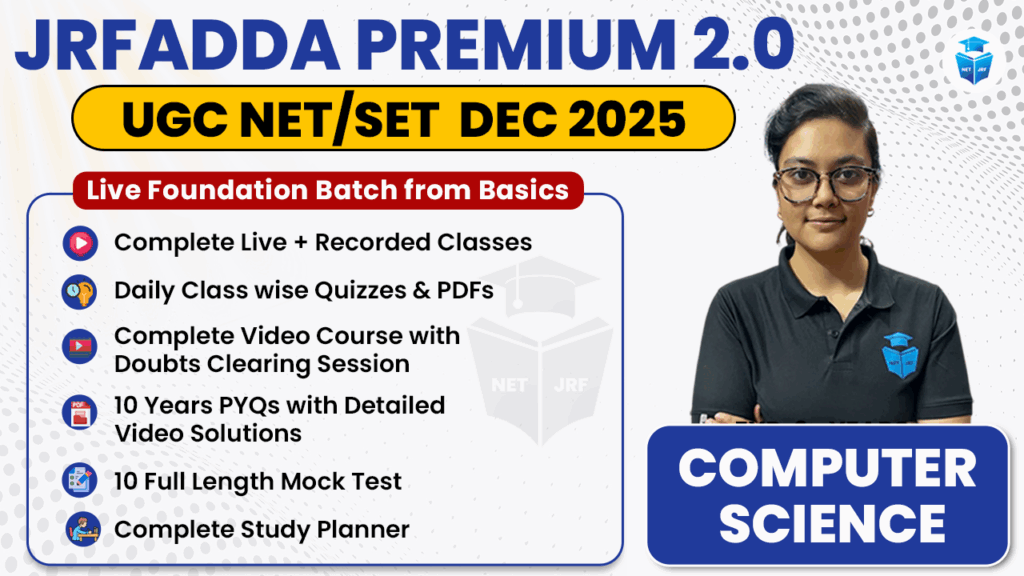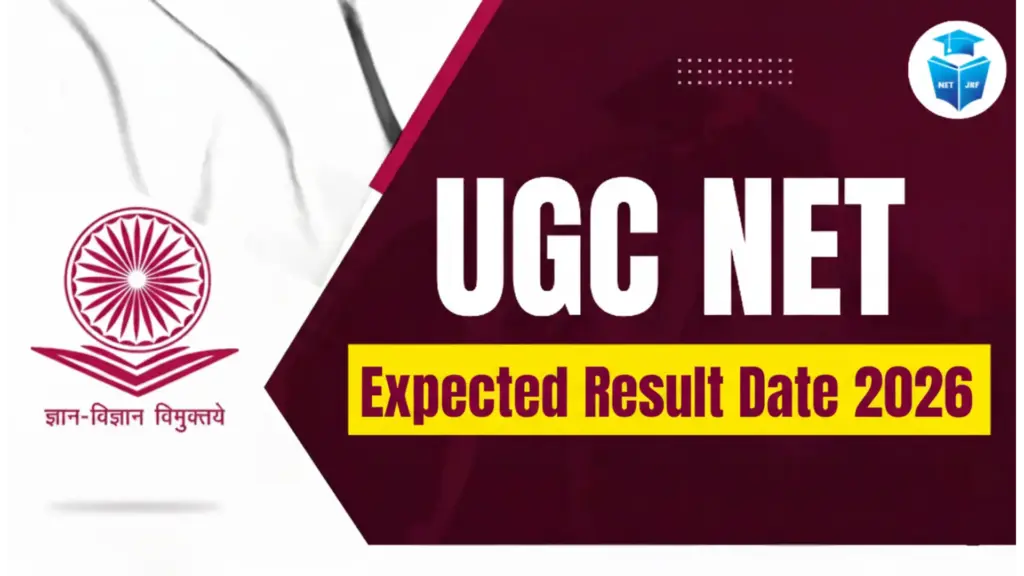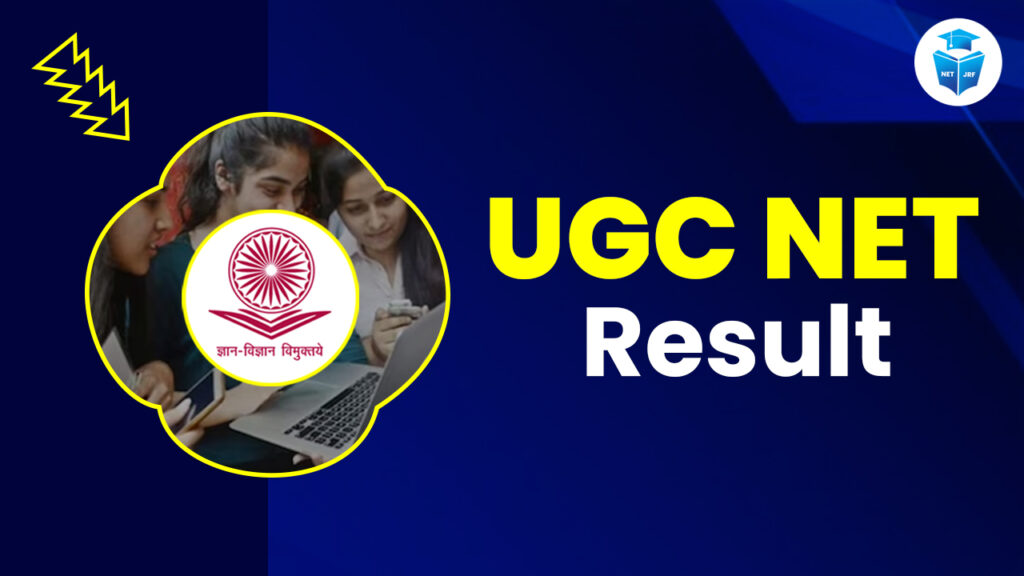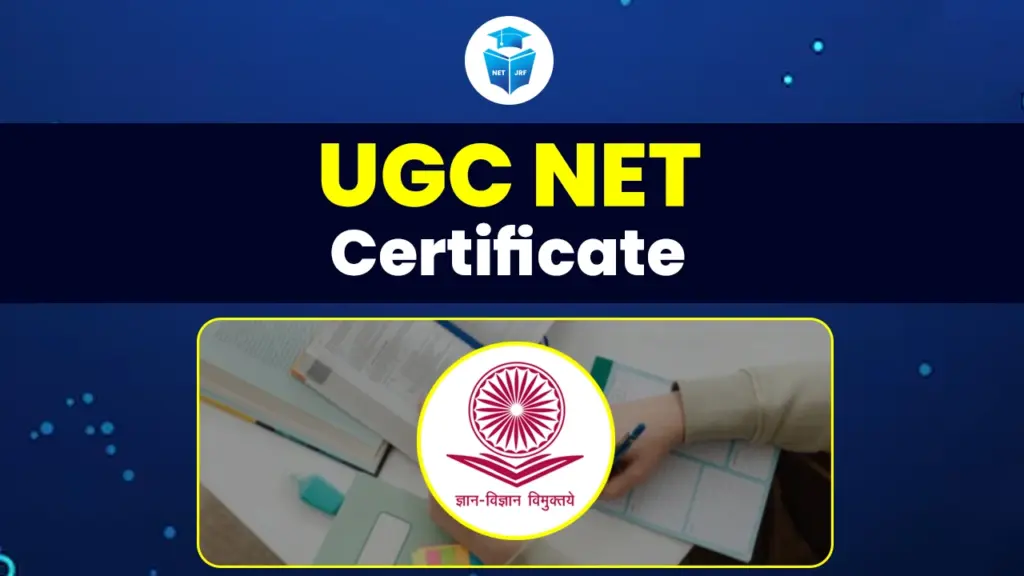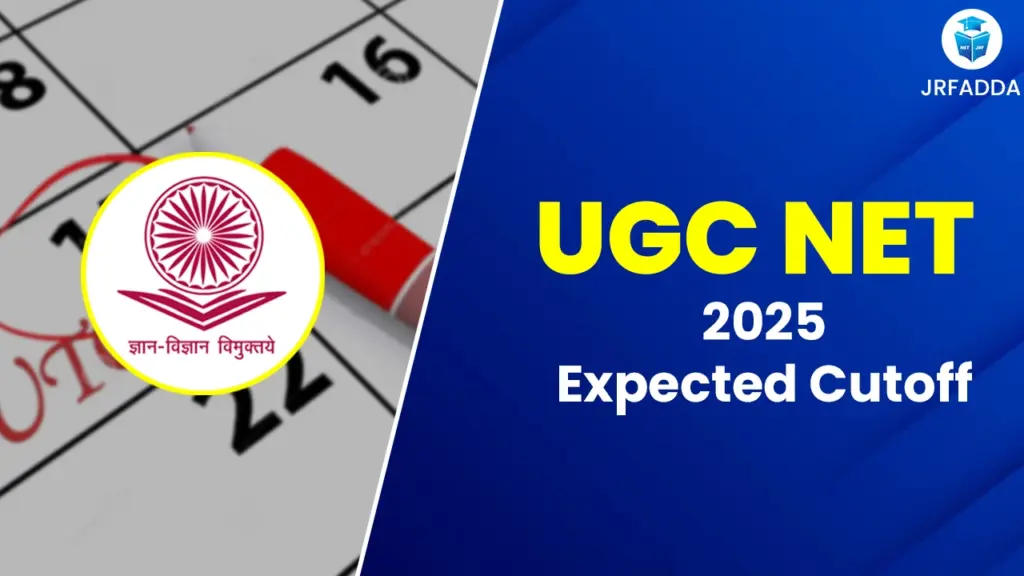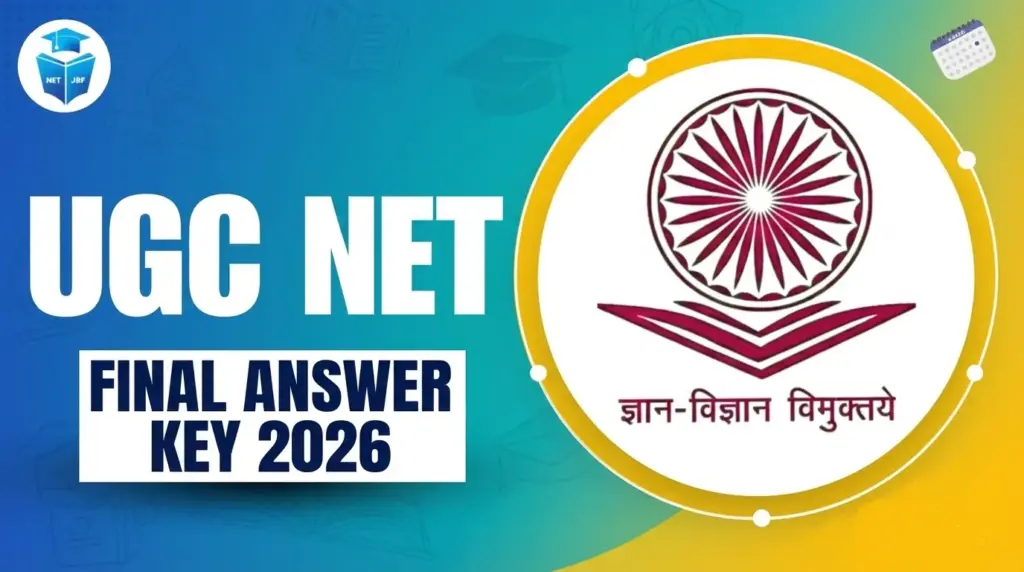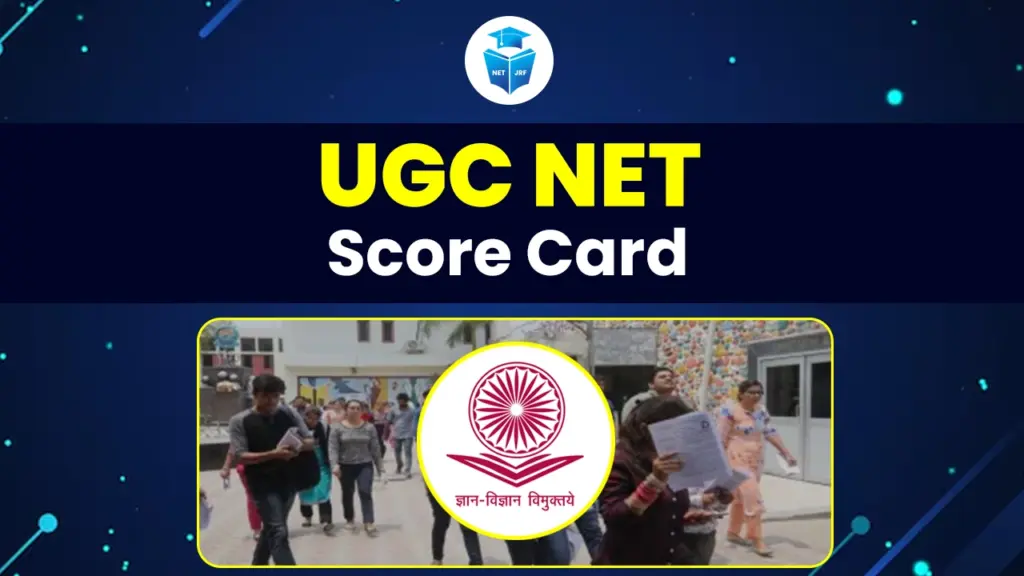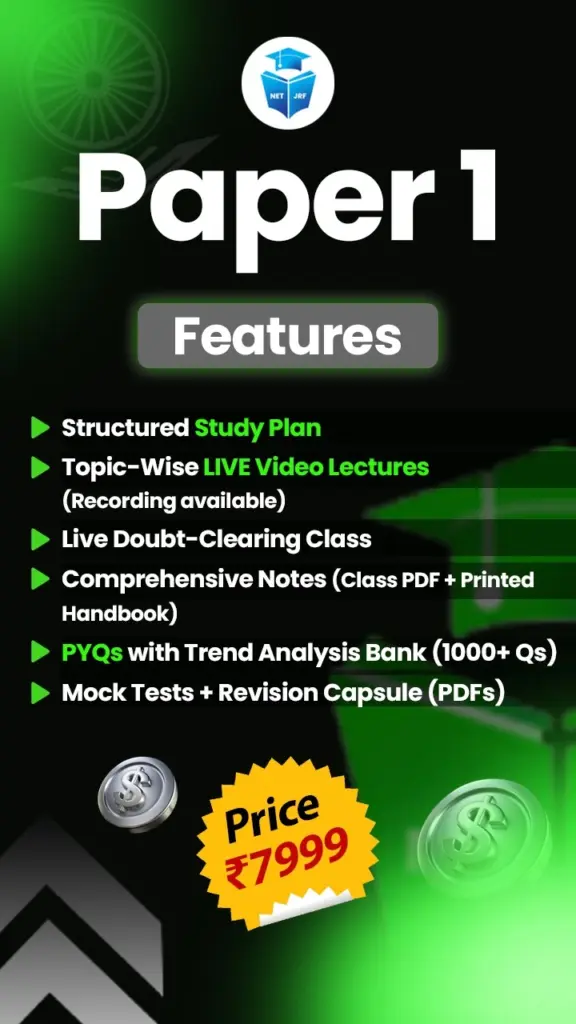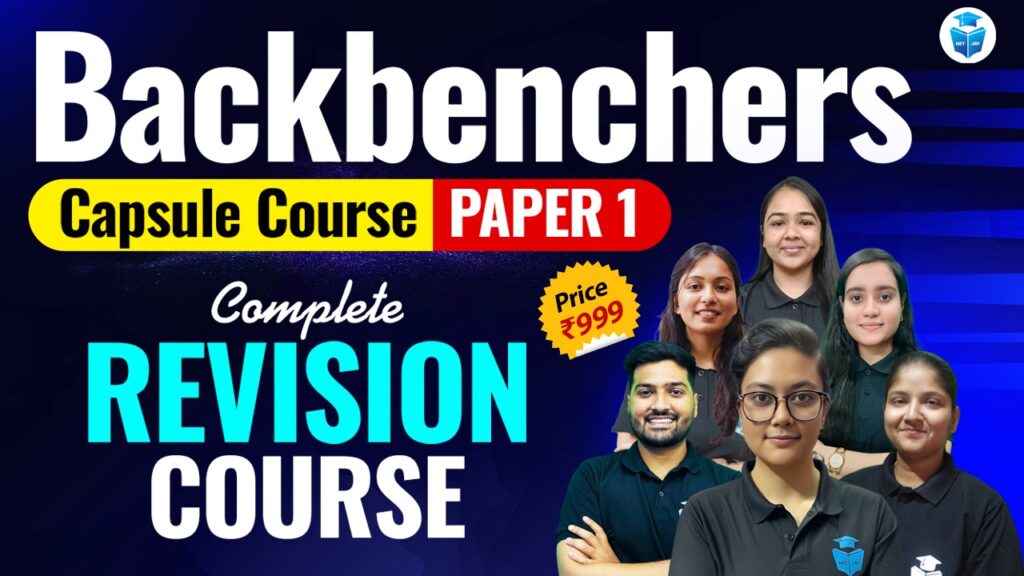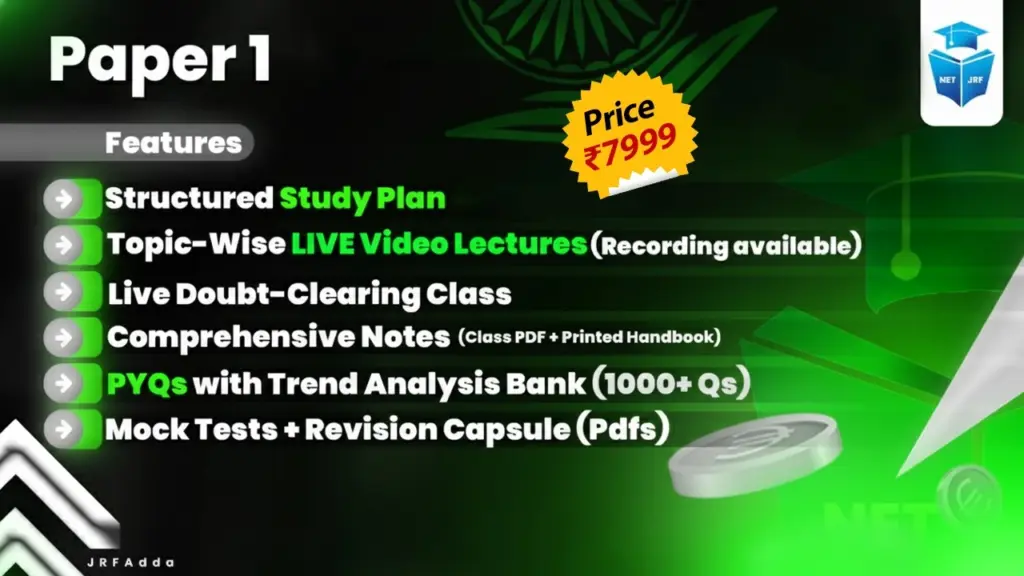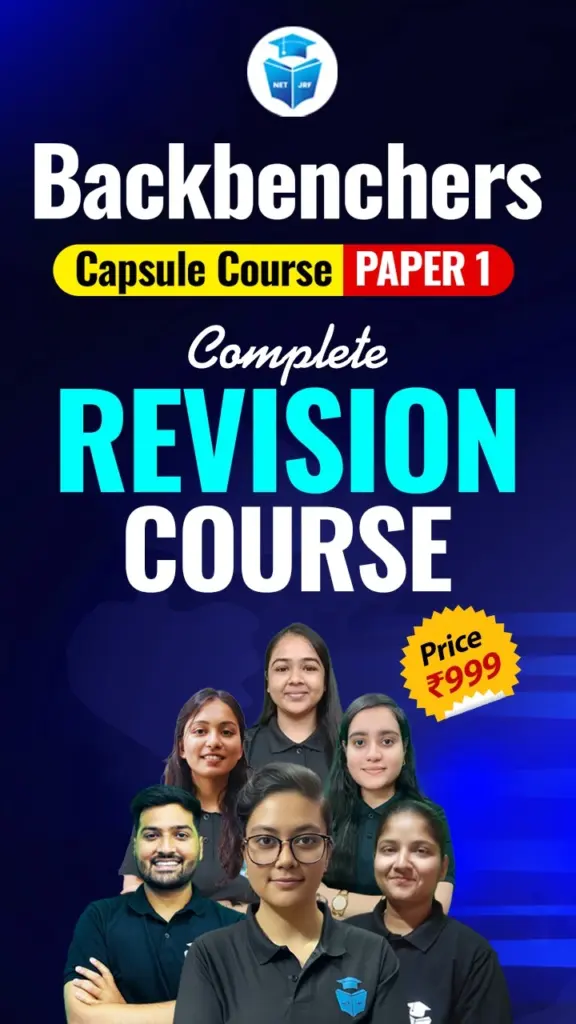UGC NET JRF 2026 is a prestigious opportunity for postgraduate students who wish to pursue research and teaching careers in Indian universities. Organised by the National Testing Agency (NTA), the UGC NET JRF Exam Date 2026 is expected from 25 June to 29 June 2026. The candidates who pass the JRF exam are provided with financial support for research courses, as well as the chance to join Ph.D. courses at well-known institutions. The JRF scholarship offers a monthly UGC NET JRF stipend, which makes it an attractive choice among those looking for academic merit.
This article includes the UGC NET JRF age limit, exam eligibility, qualifying marks, JRF stipend information, distinctions between JRF and Assistant Professor positions, and NET JRF scholarship options for UGC NET JRF 2026 aspirants.
JRFAdda Premium June 2026 Commerce Batch Paper 2- Enroll Today!
Also Read: UGC NET Expected Result Date 2026
UGC NET Exam Date 2026 June
The UGC NET Exam Date 2026 for the upcoming June cycle will be published by the National Testing Agency (NTA). The exam is expected to take place from 25 June to 29 June 2026. The UGC NET 2026 exam date subject wise schedule will be released around the mid of June 2026. The candidates are advised to enhance their preparation and stay up-to-date with the UGC NET official website regarding any further updates on the UGC NET JRF Exam Date 2026 and UGC NET JRF Admit Card 2026.
Also Read: UGC NET Exam Date 2026
What is UGC NET JRF 2026?
JRF full form is Junior Research Fellowship, which is given to candidates who secure high marks in the UGC NET exam. It is created to encourage research in different areas by giving monetary assistance to candidates pursuing a PhD or undertaking advanced research. The JRF exam is the first step towards initiating an academic and research career.
Also Read: UGC NET JRF Admit Card 2026
Benefits of Qualifying for UGC NET JRF 2026
UGC NET JRF June 2026 offers several benefits to the qualifying candidates:
- UGC NET JRF Stipend: The chosen applicants are provided a monthly PhD JRF stipend of ₹37,000 (for the first two years), which is increased to ₹42,000 upon assessment.
- Ph.D. Admission Preference: Most universities give preference to JRF-successful candidates while offering PhD admissions, simplifying the process.
- Research & Teaching Opportunities: Applicants can apply for prestigious institutes as research scholars or assistant professors.
- Preference for Government Jobs: Most government agencies, research organisations, and think tanks prefer applicants who are JRF-certified.
- Scholarship & Grants: JRF recipients can apply for research grants and funds from UGC and other agencies.
Also Read: Benefits of clearing UGC NET/JRF exam
UGC NET JRF 2026 Qualifying Marks & Selection Criteria
To be eligible for UGC NET JRF 2026, one has to score above the JRF cutoff in both Paper 1 (General Teaching & Research Aptitude) and Paper 2 (Subject-Specific). The JRF scholarship eligibility cutoff is higher than the cutoff for Assistant Professor and differs with respect to subject and category. The minimum qualifying UGC NET JRF 2026 cut-off marks are:
| Category | Minimum Percentage (Aggregate of Both Papers) |
| General / Unreserved (UR) | 40% |
| OBC-NCL / EWS / SC / ST / PwD / Third Gender | 35% |
Also Read: UGC NET Exam 2026
Difference Between JRF and Assistant Professor
UGC NET provides two significant qualifications: Junior Research Fellowship (JRF) and Eligibility for an Assistant Professor. Though both are provided on the basis of the UGC NET examination, they have different applications. Here’s a comprehensive comparison between UGC NET eligibility for Assistant Professor and UGC NET JRF scholarship eligibility:
| Factor | Junior Research Fellowship (JRF) | Assistant Professor Eligibility |
| Purpose | Supports research and Ph.D. studies with a PhD JRF stipend | Qualifies candidates to teach in colleges/universities |
| Age Limit | Maximum 30 years (Relaxation for reserved categories) | No age limit |
| Financial Benefit | Monthly UGC NET JRF stipend of ₹37,000–₹42,000 + HRA | No financial assistance |
| Career Scope | Ph.D., research, postdoctoral fellowships, government projects | Teaching at universities, colleges, coaching institutes |
| Selection Criteria | Higher cutoff than Assistant Professor | Lower cutoff compared to JRF |
| Validity | Valid for 3 years from the result date | Lifetime validity |
| Ph.D. Preference | Direct preference for Ph.D. admissions | No direct financial support for Ph.D. |
Also Read: What is the difference between NET and JRF?
Scholarship Opportunities for UGC NET JRF 2026
Here we have provided all the details regarding the scholarship opportunities for UGC NET JRF 2026:
UGC NET JRF Stipend:
- The UGC NET fellowship amount 2026 starts with ₹31,000 in the first two years.
- After two years, if the fellow is pursuing research, the fellowship is elevated to Senior Research Fellowship (SRF) with a monthly stipend of ₹35,000.
Institutional Fellowships:
- Several universities and institutions of research also provide extra grants and scholarships to JRF researchers.
Research Grants:
- The JRF fellows can seek government and private foundations’ research grants to support their research.
Stipend for JRF Qualified Candidates:
- First Two Years: ₹31,000 per month.
- Two Years after that (SRF): ₹35,000 per month (depending on performance and research progress).
- Contingency Grant: JRF fellows are also provided with an annual contingency grant of ₹10,000 for social sciences and humanities or ₹12,000 for science and engineering to meet research expenses.
Also Read: UGC NET Career Options after UGC NET June 2026
How to Prepare for UGC NET JRF 2026?
Below are points mentioned to prepare for UGC NET JRF June 2026:
- Understand the Syllabus: Pay attention to the UGC NET JRF June 2026 syllabus for both Paper 1 (General Aptitude) and Paper 2 (Subject-Specific).
- Practice Previous Year Papers: Practice PYQs to get familiar with the pattern and difficulty level of the exam.
- Time Management: Plan your studies and dedicate time to each topic.
- Mock Tests: Practice regular mock tests to enhance speed and accuracy.
- Stay Updated: Stay updated with the latest notifications of the UGC NET JRF 2026 exam and syllabus changes.
Also Read: UGC NET Preparation Tips 2026
UGC NET JRF Syllabus 2026 For Paper 1 & Paper 2
The test evaluates candidates on teaching skills, research capabilities, logical reasoning, and subject matter for Assistant Professor and Junior Research Fellowship (JRF). The UGC NET JRF 2026 syllabus comprises two papers:
- Paper 1 – General Teaching & Research Aptitude (Common to all subjects)
- Paper 2 – Subject-Specific (According to the subject opted by the candidate)
JRFAdda Gold June 2026 Philosophy Batch (Paper1+Paper2)- Enroll Today!
UGC NET JRF Syllabus 2026 Paper 1 (General Paper – Common for All Candidates)
The UGC NET JRF 2026 Paper 1 examines candidates on the basis of teaching and research aptitude and has 50 multiple-choice questions (MCQs) of 100 marks. The UGC NET JRF syllabus 2026 for Paper 1 is as follows:
| Unit No. | Topics Covered |
| Unit 1 | Teaching Aptitude – Methods, Characteristics, Learner-Centred Teaching |
| Unit 2 | Research Aptitude – Types, Methods, Ethics, Paper Writing |
| Unit 3 | Comprehension – Passage-Based Reading & Interpretation |
| Unit 4 | Communication – Verbal, Non-Verbal, Classroom Communication |
| Unit 5 | Logical Reasoning – Analogies, Deductive & Inductive Reasoning |
| Unit 6 | Data Interpretation – Tables, Graphs, Charts, Percentage Analysis |
| Unit 7 | Mathematical Reasoning – Number Series, Relationships, Equations |
| Unit 8 | Information & Communication Technology (ICT) – Basics of Digital Learning |
| Unit 9 | People & Environment – Climate Change, Pollution, Environmental Laws |
| Unit 10 | Higher Education System – Policies, Governance, Quality Standards |
Also Read: UGC NET Syllabus 2026
UGC NET JRF Syllabus 2026 Paper 2 (Subject-Specific)
The UGC NET JRF 2026 Paper 2 comprises 100 MCQs that carry 200 marks, including in-depth knowledge of the opted subject. There are 85 subjects. Some of these trendy UGC NET JRF 2026 subjects are listed below:
Some Trendy UGC NET Subjects for JRF
- Commerce – Business environment, accounting, marketing, finance.
- Education – Educational philosophy, psychology, curriculum development.
- Law – Jurisprudence, constitutional law, criminal law, corporate law.
- Computer Science – Algorithms, databases, programming, AI, networks.
- Political Science – Political theory, public administration, international relations.
- History – Ancient, medieval, modern, and world history.
- Economics – Micro & macroeconomics, statistics, growth, and development.
- Management – HR, marketing, finance, operations, strategy.
- English – British English, American English, Indian literature, literary theory.
- Sociology – Social institutions, research methods, sociological theories.
Also Read: UGC NET History Syllabus 2026
UGC NET JRF Eligibility Criteria 2026
The UGC NET JRF eligibility criteria 2026 involve educational qualifications, age restrictions, and minimum marks for eligibility to sit for the JRF exam. The applicants need to satisfy these JRF requirements to be able to meet the JRF exam eligibility for the UGC NET JRF 2026 June exam.
- Master’s degree with a minimum of 55% marks from a recognised university for SC/ST/OBC/PwD with 50%.
- The maximum age for JRF is 30 years. OBC/SC/ST/PwD and women candidates get an age relaxation of 5 years. Upper age limit for Assistant Professor is not restricted.
Also Read: UGC NET Eligibility Criteria 2026
UGC NET JRF Age Limit 2026
To meet the JRF requirements for the UGC NET JRF 2026 exam based on the age limit, the candidate must review the UGC NET JRF age limit criteria, along with the age relaxations listed in the table ahead:
| Category | Age Relaxation |
| General | 30 years |
| OBC-NCL, SC, ST, PwD, Third Gender, Women | 5 years (up to 35 years) |
| Candidates with research experience | Up to 5 years (as per duration of research) |
| Armed Forces personnel (ex-servicemen) | 5 years |
| L.L.M. Degree holders | 3 years (up to 33 years) |
Also Read: UGC NET JRF Age Limit 2026
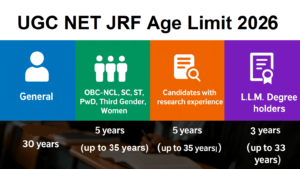
Nationality Criteria
The candidates must meet the UGC NET JRF 2026 nationality criteria to be able to sit for the examination.
- The candidates should be Indian nationals.
- Foreigners can apply upon UGC recognition and need to authenticate their qualifications.
Number of Attempts
Check out the UGC NET JRF 2026 number of attempts a candidate is allowed in the exam.
- No maximum number of attempts is provided for Assistant Professor eligibility.
- For JRF, the candidates should qualify prior to the cut-off age (30 years for General category and 35 years with relaxation).
JRFAdda Premium June 2026 UGC NET Paper-1 Batch- Enroll Today!
UGC NET JRF Reservation Policy 2026
The candidates must review the UGC NET JRF 2026 reservation policy before applying for the exam and check whether they meet the UGC NET JRF requirements to avail any relaxations based on reservation.
- Reservation by category is done according to the Government of India regulations.
- Candidates should present genuine caste, disability, or EWS certificates to avail of relaxation.
Also Read: UGC NET JRF Exam Pattern 2026
Previous Years UGC NET JRF Cutoff
Analysing the recent years of UGC NET JRF cutoff trends gives candidates an idea of the level of competition, marks to be expected, and preparation strategy. Here’s a year-wise breakdown based on previous years:
| Year | General (UR) JRF Cutoff | OBC-NCL JRF Cutoff | EWS JRF Cutoff | SC JRF Cutoff | ST JRF Cut Off |
| December 2025 | TBA | TBA | TBA | TBA | TBA |
| June 2025 | 195-215 | 185-205 | 182-202 | 172-192 | 168-188 |
| December 2024 | 206-224 | 196-220 | 198-224 | 188-208 | 180-224 |
| June 2024 | 200-220 | 190-210 | 192-215 | 180-200 | 170-190 |
| December 2023 | 198-215 | 188-205 | 190-210 | 178-195 | 168-185 |
| June 2023 | 195-210 | 185-200 | 187-205 | 175-190 | 165-180 |
| December 2022 | 192-208 | 182-198 | 184-200 | 172-188 | 162-178 |
| June 2022 | 190-205 | 180-195 | 182-197 | 170-185 | 160-175 |
Also Read: UGC NET Expected Cut Off 2026
Conclusion
UGC NET JRF 2026 is an excellent opportunity for candidates competing for a research or teaching career in Indian universities. The JRF full form is Junior Research Fellowship, and with its monetary benefits, the advantage of admission to a PhD, and priority in academic and research organisations, passing the UGC NET JRF 2026 exam can be a career booster. The test requires serious preparation, efficient time management, and an intimate knowledge of Paper 1 and Paper 2 topics. Since cutoff trends have been increasing, candidates must target higher marks and remain current with exam notifications. For those who want to clear the UGC NET JRF 2026, conceptual clarity, mock tests, and analysis of previous year papers will be the key. Begin early, remain regular, and stay updated regarding the UGC NET JRF Admit Card 2026 release to increase your chances of succeeding in the UGC NET JRF 2026 exam!
UGC NET JRF 2026 FAQs
What is the distinction between UGC NET JRF and Assistant Professor?
JRF offers a research stipend that is valid for three years and can be used by candidates to study Ph.D. Assistant Professor eligibility makes candidates eligible for teaching but does not provide financial assistance.
What is the age limit for UGC NET JRF 2026?
The UGC NET JRF 2026 age limit for general candidates is 30 years as of June 1, 2026. Reserved categories (OBC-NCL, SC, ST, PwD, Women) are relaxed for 5 years (up to 35 years).
How much attempt is provided for UGC NET JRF?
For the UGC NET JRF 2026 exam, attempts are limited due to age, since candidates have to qualify before reaching the upper age limit.
Do NET qualified get stipend for the UGC NET JRF 2026?
Yes, the candidates qualifying the UGC NET JRF 2026 get a certain UGC NET JRF fellowship amount 2026 initially starting with ₹37,000 and might reach up to ₹42,000.
What is the minimum passing percentage for UGC NET JRF 2026?
The minimum qualifying percentage for UGC NET JRF 2026 is:
- General category: 40% (aggregate of both papers)
- OBC-NCL, SC, ST, PwD: 35% (aggregate of both papers)
